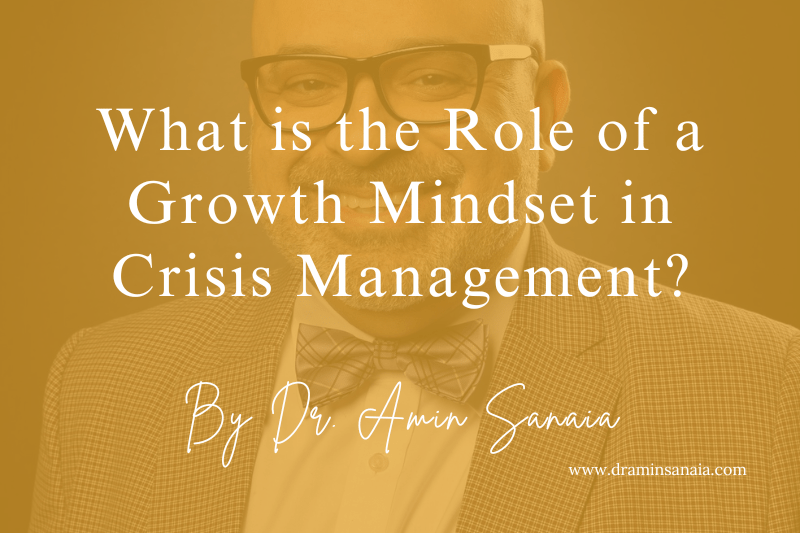What is the Role of a Growth Mindset in Crisis Management?

Are you looking for Growth Mindset in Crisis Management? well you know that,
We’re going through a very tough time after Covid-19, which has disrupted everyone’s lives unexpectedly.
This pandemic doesn’t discriminate—it affects people of all ages, races, and backgrounds.
Despite these challenges, we can find comfort in the fact that we’re all in this together, working to stop the virus and protect humanity.
Difficulties are part of life, but we can turn them into opportunities by changing how we think. The pandemic has forced many changes: people have lost jobs, isolated themselves, and faced new feelings of vulnerability.
Did we shift our mindset? or can we have a Growth Mindset in Crisis Management?
At SAN Consulting, we’ve faced challenges too. Instead of focusing on the negatives, we shifted our mindset.
We adapted our workshops to be remote and expanded our online services with new learning modules.
Rather than dwelling on what we can’t do, we’re focusing on what we can change.
We’re actively searching for the positive aspects this situation has brought us.
How Can You Change?
How you respond to change determines whether you thrive or just survive. Thriving means feeling more fulfilled and successful despite changes. Surviving means feeling threatened by change.
Having a growth mindset is crucial for thriving. It means being open to change, curious, and forward-thinking. On the other hand, a fixed mindset resists change and focuses on the past.
How Can This Be a Positive Lesson?
If we look for the positives in this experience, we can shift our mindset and habits to adapt to this new reality. We need to ask ourselves:
- How can we learn and grow from this experience?
- How can we focus on the positives?
- What lessons can we take away from this?
The pandemic had positive impacts too, such as improvements in the environment, businesses adapting, and a deeper appreciation for things like family and community.
Here are Five practical tips to have a growth mindset while working:
- Patience is Key: Adapting to remote work takes time. It’s important to acknowledge and appreciate the effort, even if the results aren’t perfect right away.
- Learn and Teach: Share what you’re learning with your team and encourage them to share their insights too. This creates a culture of continuous learning.
- Lead by Example: Show your team that learning and growth are priorities. Ask about what they’re learning and celebrate their progress, not just their successes.
- Adapt Feedback Practices: Use remote work as an opportunity to improve how your team gives and receives feedback. Being open to change can lead to better communication and collaboration.
- Understand Your Team: Remote work allows you to see your team members in new ways—like their home life. This deeper understanding can foster creativity and strengthen teamwork.
To maintain smooth operations and support our teams through any changes, resilience and inclusivity are essential.
We must keep an open mind not only about our own tasks but also about others’ roles and the value they bring to the organization as a whole.
This perspective is known as a growth mindset.
Our mindset shapes how we approach goals in both our professional and personal lives, influencing how we interpret successes and setbacks.
Research demonstrates that our mindset affects how we perceive workplace experiences and influences our emotional, cognitive, behavioral, and neural responses to them.
Key benefits of growth mindset within organizations
In NLI’s recent white paper, “Impact Report: Growth Mindset Supports Organizations Through Disruption,” they outlined three key benefits of growth mindset within organizations:
- Behavior Change at Scale: NLI measures the success of interventions by tracking the adoption of new habits across organizations. For instance, in a study involving 734 employees from five organizations, the GROW learning solution led to significant results: 99% of participants felt better prepared to handle change, 91% regularly discussed growth mindset topics, and 90% shifted from a fixed mindset weekly.
- Increased Employee Engagement: Through the research using Behavior Change Percentage (BCP) metrics, we found that organizations promoting a growth mindset experience higher levels of employee engagement. By incorporating growth mindset questions into regular surveys, these organizations reported enhanced engagement and reduced turnover rates during periods of major change.
- Greater Workplace Satisfaction: Cultivating a growth mindset culture correlates with higher levels of workplace satisfaction. Using the Organizational Climate Survey (OCS), they identified key characteristics of a growth mindset culture that significantly enhance employee satisfaction.
Final Thoughts:
These findings show the importance of a growth mindset to navigate uncertainty and strengthen organizational resilience. As leaders confront ongoing challenges, integrating learning solutions focused on developing growth mindsets remains a critical strategy for NLI, ensuring sustained positive impacts across organizations.
Resisting change comes from a fixed mindset, which limits us. Embracing change with a growth mindset allows us to be flexible and open-minded, which is crucial for thriving in times of uncertainty.
What lessons are you taking away from this experience? How do you plan to grow and change because of it?
If you have read this, you are awesome. Connect with me on my YouTube channel for visual information.
Plus If you want to receive direct messages, join my Instagram army.